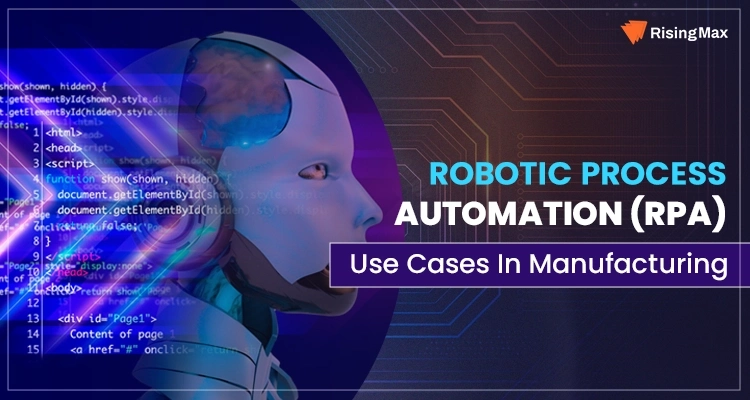After the industrial revolution, the era changed & showed the execution of computers into production. And now, in the 21st century, the era of digitalization and advanced technology shows the best implementation of Artificial Intelligence & Machine Learning & RPA in manufacturing industry.
If you are providing any service, then implementing an RPA system is going to be the best decision. Building robotic process automation software for your business will help maximize production and minimize errors in the continuous manufacturing process.
RisingMax Inc. is the leading RPA development company with a team of 150+ developers and has delivered more than 200 projects of RPA globally. We provide development services for industries like real estate, healthcare, automotive, Ecommerce, logistics, education, travel & tourism, and banking & finance.

In this blog, you will get complete information about robotic process automation in manufacturing industry and how to get the RPA software for your manufacturing unit.
Why Does The Manufacturing Industry Need RPA?
Manufacturing is more equipped to utilize digital workers to their full capacity than many other industry sectors. After all, manufacturers are aware of how automation can successfully fulfill customer demands and utilize resources because they were early users of robots on the manufacturing line.
Although many manufacturers have made considerable advances to automate operations, difficulties still exist. There are various chances for industry automation due to problems like disconnected silos and manual supply chain operations.
Based on the amount of production that can be done, there are three different types of manufacturing automation: fixed automation for high-volume production, programmable automation that works best for batch production, and the new age flexible automation that is necessary for real-time, customized production.
In this type of production automation, repetitive tasks were carried out automatically. However, these robots’ capacity for making decisions has significantly increased with the development of AI and RPA in manufacturing. As a result, they can perform duties across the full production process. The implementation of RPA is widespread in the supply chain.
Build Powerful RPA Solutions For Manufacturing with RisingMax!
Adopt this innovative automation technology if you are a manufacturing company. We have years of experience in building robust RPA solutions.
Smart Automation & RPA Use Cases In Manufacturing
Here are some of the RPA use cases in manufacturing industry that will help you to understand how the RPA software solution will be a beneficial option for your business and hope you can get a high-end and reliable RPA for the manufacturing unit. Implementing robotic process automation in these diverse use cases within the manufacturing industry drives operational efficiency and positions businesses to adapt to the dynamic challenges and opportunities in the global marketplace.
Data Migration
Data migration is shifting data from an old system to a new one. This is a common occurrence in the manufacturing industry. RPA is an excellent alternative for data movement. When a firm acquires a new business, it should preserve a business book that contains its policies. Even for a small business, data migration involves time and money. Proper RPA planning and implementation will undoubtedly shorten the durations and expenses.
Data Automation of Logistics
Every manufacturing firm should have a logistics department that oversees the conveyance of finished goods to customers. The transportation management system should be connected with RPA to provide improved services more quickly.
We can effectively monitor product transit by integrating the RPA transport management system. It will cut down on human errors. When a corporation has numerous carriers and insurances, the RPA will provide a report indicating which option provides the best cost, insurance, and transit time.
You can have real-time freight tracking while incorporating RPA in manufacturing industry; this will give you and your customer a more detailed report on when the product will arrive and shipping costs.
Web Integrated
A well-established corporation may have many plants and offices. A manufacturing industry may quickly monitor, access, and update any changes in web-connected systems while using RPA in this region. This decreases communication time from one branch region to another. The next game changer in the manufacturing business is process automation. A manufacturing industry that wishes to maximize its production, management, and administration should consider implementing RPA in all functional areas.
Active Chat Support
When it comes to Ecommerce services, the number of users is huge. As per the projection for 2023, the total number of users on the e-commerce platform will be about 7.6 billion worldwide. Amazon has 350 million users who will be active in 2024. One hundred ninety-seven million of these active users visit Amazon.com each month. Amazon offers to ship to more than 100 nations. Managing such a huge user base is next to impossible for any company.
RPA’s chat support is the perfect option for any service provider in such a situation. The RPA software will help the company answer users’ queries more accurately and without friction. You can also implement the Natural Language Processing(NLP) chatbot for customer support. This will help the business deal with the users with natural humans but without the involvement of humans.
Supply Chain Management
RPA can streamline supply chain processes by automating order processing, inventory tracking, and demand forecasting. This improves efficiency, reduces errors, and enhances overall supply chain visibility. Automating order processing and invoicing tasks accelerates the fulfillment process. RPA in manufacturing can extract relevant data from orders, generate invoices, and update the system, minimizing manual intervention and reducing processing times.
ERP Integration
RPA integration in ERP could be the next step in resource planning. Inventory, Accounts Payable and Receivable, Pricing, and other reports are generated automatically. You can send them via email or upload them to a SharePoint folder. A manufacturing sector can monitor current inventory and alert them when supply is low in the inventory area. Then, you can automate the reordering process.
Inventory Management
RPA facilitates accurate and real-time inventory management by automating tasks such as stock level monitoring, reorder notifications, and updating inventory databases. This helps optimize stock levels and minimize the risk of stockouts or overstock situations. RPA can schedule and coordinate inventory maintenance activities. It can also integrate with predictive maintenance systems, analyzing sensor data to predict equipment failures and trigger maintenance tasks proactively.
Production Planning & Scheduling
RPA assists in optimizing production planning and scheduling by automating the analysis of demand forecasts, resource availability, and production capacity. This ensures that production processes align with market demand, minimizing lead times and maximizing resource utilization. RPA can automate the collection and reporting of data needed for compliance, reducing the time and effort required to compile and submit regulatory reports.
Customer Support & Communication
Automating customer support tasks, such as order status inquiries or product information requests, enhances responsiveness. RPA can also be utilized for sending automated notifications to customers about order shipments or delays. RPA can streamline communication with suppliers and vendors by automating order updates, payment processing, and other communication tasks. This ensures smoother collaboration and reduces the risk of delays or errors.
Bill Generation
This is an important consideration in manufacturing; it includes a lengthy list of materials and components required to manufacture a new product. Its primary job is to provide employees with all the information they require in developing new commodities, such as what, when, where, and how to purchase.
Errors at any of these stages might cause a negative chain reaction throughout the production cycle, resulting in enormous losses for your firm. As a result, RPA in manufacturing industry, with its potential for error-proof task performance, is required because it promotes correct and on-time process completion.
Searching For A Reliable RPA Solution With High-End Features?
Benefits Of RPA In Manufacturing
The RPA will omit multiple issues from the production and manage the complete procedure with high-end features and implementation of the artificial intelligence. Here are some of the benefits of RPA in manufacturing that you will get if you hire an RPA development company.
Deal With Manpower Shortage
The RPA software will fulfill the shortage of manpower if any of the labour is off from work. RPA software will allow your manufacturing to deal with a sudden shortage of manpower. Another benefit is shifting the manpower onto the more important site work instead of indulging them with repetitive and less important work.
Better Safety At Work Station
Automation increases worker safety by automating excessively repetitive and risky manual tasks. Furthermore, because RPA software bots can perform repeated activities for extended periods of time, they can enable people across multiple departments to produce more output in less time, avoiding difficulties such as burnout. Workers can now concentrate on overseeing the process and troubleshooting faults as needed rather than personally carrying it out.
100% Accuracy & Quality
RPA in manufacturing improves services for processes with a high likelihood of human error, boosting accuracy. Robots are reliable and can work more effectively. They also significantly minimize the number of reworks and increase output quality. The best thing is that robots obey all rules to the letter, resulting in 100% accuracy in process results.
Cost-Effective Solution
Employing robotics is anticipated to reduce operational costs by 25-50%. When compared to humans, who work 8/5 and have a set number of yearly leaves each year, robots can function 24 hours a day, 7 days a week. Having robots take over part of humans’ manual labour could result in tangible benefits for the organization. Automation can help you recover the investment in a short period of time, and then it’s all about profits!
Why RisingMax Inc. Is The Leading RPA Development Company?
RisingMax Inc. has been serving the IT industry globally since 2011 and has delivered more than 200 RPA projects. We have delivered the high-end RPA solution for multiple enterprises and startups globally.
- We hold a client retention rate of 98%.
- One out of four companies we served is among the Fortune 500.
- 95% of our clients believe that we served them transparently and with 100% accuracy.
- 5-star rating by clients on popular rating & review websites like Clutch and GoodFirms.
- Engagement Models At RisingMax Inc.
- We provide a flexible and effective hourly-based model.
- We offer a fixed price model to keep complete transparency and no hidden charges.
- Dedicated RPA programmer who holds the experience of more than 10 years as a developer.
Procedure We Follow For RPA Solution Development For Manufacturing
Requirements: Firstly, our customer executives hear out your requirements and features that you want in your RPA solution and make sure to figure it out from every minor and major point.
Research: as the next step, our team will do in-depth research and draw the blueprint/roadmap for the development of the solution.
Exchange of Ideas: RisingMax’s team will get in touch with you after the complete research and a plan to develop the solutions.
Development: once we meet at the midpoint, our developer’s team will move forward with high-end RPA for manufacturing solutions.
Beta Testing: Before the final launching of the project, go through the multi-level testing procedure, including beta testing.
Deployment: The final step is deploying the software for robotic process automation in manufacturing industry. We deliver the project after making the software go through multiple testing levels to omit errors.
Don’t Wait For Perfect Time
This is the perfect time to implement the RPA solution in your business to cut costs and make things more accurate and less hectic. RisingMax Inc. provides free consultations for RPA in manufacturing industry.
Contact Us Now!














